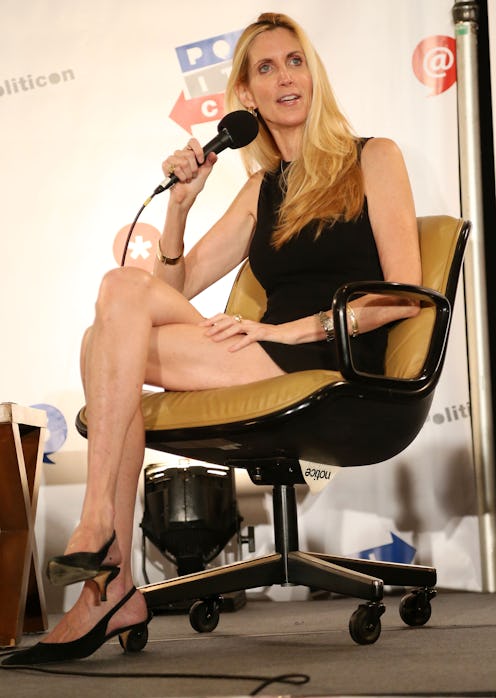News
The ACLU Supports Ann Coulter's Freedom Of Speech

On Nov. 9, the American Civil Liberties Union (ACLU) changed its banner to a picture of the newly-elected President Trump next to a four-word pledge: "See you in court." It had been less than 24 hours since Trump's win shocked at least half the country, and the sheer presence of mind and unmitigated defiance in that single image exemplifies why the ACLU has become a kind of hero to yet another generation of disaffected Americans. But perhaps unknown to its younger supporters, the ACLU's history proves it is an organization committed to principles, not party. And it demonstrated that today by taking a stance many of their left-leaning supporters probably won't like: defending Ann Coulter's freedom of speech.
The issue at hand is Coulter's planned speech at the UC Berkeley campus, where she had been invited to appear by two college groups, the Berkeley College Republicans and the Young America Foundation. Her first scheduled speech was canceled due to threats of violence, but Coulter vowed to speak anyway. Then the two groups pulled their sponsorship, citing concerns over the safety of their own members, and Coulter had only two options: Back down or attempt to speak outside without any police protection.
Given the choice, Coulter said there was no way to go forward. "It's a sad day for free speech," she told The New York Times.
Coulter was not wrong to assess the possibility of violence as a real one, given the similar reaction to a planned event featuring Milo Yiannopoulos earlier this year. The alt-right poster boy's impending speech incited a riot, one in which police had to arrest 20 people. According to Andrew Greenwood, Berkeley's city police chief, certain groups of political antagonists had come "armed and ready to fight."
It seems the ACLU agrees with Coulter, as the organization sent out a tweet yesterday that brings up a useful term for the current Berkeley situation: a "heckler's veto." By raising the specter of violent retaliation, those who wish to silence someone are able to prevent them from ever speaking at all. Campus officials and police (or any organizing body) may legitimately feel uncertain about their ability to ensure a safe environment for certain speakers. However, by giving in to the demands of those who threaten the safety of others, free speech has effectively been shut down. Such is the heckler's veto, and it is an apt descriptor of how Coulter was kept from speaking at Berkeley.
The issue of free speech on college campuses has been occurring with increasing frequency in the news over the past decade. The most recent incident to make headlines was the attempted speech at Middlebury College by Charles Murray, author of the immensely controversial book, The Bell Curve. When he took the podium last month, a large group of students in the audience stood up, turned their backs to him, and began loudly reading a statement before breaking into anti-Murray chants. After 20 minutes, it was clear Murray would not be able to speak. When he and a "left-leaning" female professor — Lisa Stanger, who had come to question Murray's arguments — attempted to leave, protesters followed. One grabbed Stanger by the hair, twisting her neck hard enough that she later went to the hospital and was given a neck brace.
Besides the frightening escalation of protest to physical violence, many fear that the trend of shutting down certain speakers on campus is growing, and that it could lead to some extremely illiberal spaces. As Peter Beinart points at The Atlantic, if Middlebury students take the opposition to same-sex marriage as a form of hate speech, what's to stop them from shutting down almost any Republican speaker from having a voice on campus — including fellow students? Beinart emphasizes that he finds the anti-same-sex marriage view bigoted, but advocates the oft-cited idea that more speech is the answer to bad speech.
This certainly seems to be a view shared by the ACLU. Amber Phillips gives a succinct rundown at The Washington Post of some highly controversial groups and individuals they've defended over the years, including: supporters of the Confederate flag, the KKK, the Washington Redskins, and even Rush Limbaugh. When it comes to the issue of free speech, the ACLU is all-in on protecting it — even if that means coming to the defense of Ann Coulter.